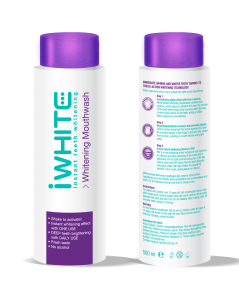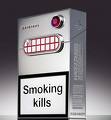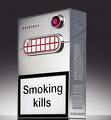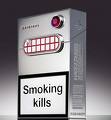The most recognisable sign of a smoker is yellow stained teeth from the build-up of toxic chemicals from tobacco onto the surface.
If your teeth have been discoloured by the effects of smoking (or coffee or wine), erase stains and turn back the clock to a more healthier-looking you this Stoptober no-smoking month, by restoring your smile with a new at home products Luster and iWhite. All are available to buy atBoots.com
iWhite Whitening Toothpaste attacks surface and deep tooth staining with an active whitening formula for daily use. iWhite Instant toothpaste also strengthens and remineralises teeth, for an intensely shining smile that is strong as iron. iWhite Whitening Toothpaste 75ml, £9.95.

Buy at Boots.com
iWhite Whitening Mouthwash gives an immediate instant whitening effect with ONE USE and DEEP teeth brightening with DAILY USE thanks to triple-action whitening technology. iWhite Whitening Mouthwash 500ml, £8.95.

Buy at Boots.com
Luster Premium White Pro Light Whitening System is the UK’s first complete DIY teeth whitening kit to use the same paint-on whitening gel and Dual-Action ‘blue light’ technology used by dentist, to quickly and safely achieve a smile that makes you feel new. And best of all, you can do it right at home – on your schedule. Luster Premium White Pro Light Whitening System £49.99.

Buy at Boots.com


 Nick who has had more than his fair share of negative publicity over the years.
Nick who has had more than his fair share of negative publicity over the years.





